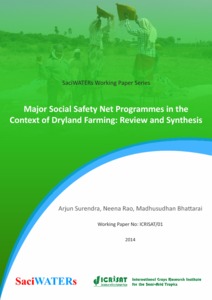Major Social Safety Net Programmes in the Context of Dryland Farming: Review and Synthesis. Working Paper, (SaciWater WP- 01/2014)
Abstract
Poverty is a major issue in rural India, especially in the semiarid tropic region of India. In order to alleviate poverty the Government of India, and state governments, like governments world over, have instituted social protection and social safety net programmes. This paper seeks to review and synthesize implementation of the major social safety net programmes in India and globally and document various social safety net programmes that area commonly being implemented in the semiarid tropical regions of Andhra Pradesh. In order to do this, this paper investigates the existing definitions of poverty, and vulnerability with a special focus on the semiarid tropics of India and examines the need for social assistance in this region. The concepts of social protection in terms of social protection programmes and social safety nets are also investigated. A review of social protection programmes from all over the world is carried out – examining the different programmes in developed nations such as Germany, United States and United Kingdom; developing nations, with a focus on Latin America; and least developed nations in Africa. In this range of studies, it is possible to see how social protection programmes vary, from the more affluent nations, where these programmes are more contributory in nature, dealing more with health and temporary relief in cases of unemployment. Whereas in the less developed nations, where SPPs are a more non-contributory in nature, and form a much more essential part in ensuring livelihood security. The paper then examines the most important social protection programmes in India, in great detail providing a history of development of important schemes meant to ensure food, nutritional and livelihood security, such as the PDS and NREGA among other import programmes, and talks about the criticisms and shortcomings of the programmes. The various SPPs in Andhra Pradesh are examined, with a special focus on Self- Help Groups which are mostly comprised of women have been instrumental in improving well being, not just of women but also of families. There have been reports of issues with many social protection programmes in India, in terms of access, leakages, benefits not being received, the cost effectiveness of these programmes , lack of gender sensitivity in the programmes and so on. Despite all the flaws and gaps in implementation, the way now is forward. There is an urgent need to study how access or lack thereof to the various official and non official social safety net programmes have affected not just the intended direct and indirect beneficiaries, but also those in rural India who are not beneficiaries of the programmes, but who may directly or indirectly be affected by them, either positively or negatively

